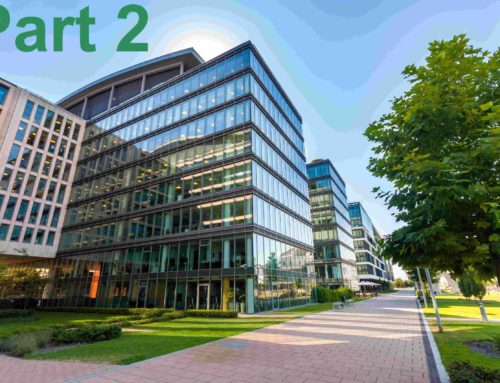August 2018, my phone rings. It’s a friend of mine calling seemingly out of the blue. We chop it up with some small talk. How’s the family? How’s the back to school routine? What’s this football season about to look like? I knew eventually we’d get to some business talk…because that’s what we do. He finally hits me with, “So I hear you’ve been looking for an investment property?” I say, “Yea man, we have. You have any good leads?” He didn’t have any leads on a property. Instead, he asked, “Have you considered commercial?” I paused, thinking to myself, “Well no. No I haven’t at all.”
Commercial vs. Residential: An Overview
Let me take a minute to quickly give an overview of commercial vs. residential real estate. To boil it down to the simplest terms, commercial real estate houses a business and residential real estate houses people. That CVS on the corner is a commercial property. That house up the street where James lives is a residential property. The two are legally zoned for their particular use, meaning that CVS legally shouldn’t have people living there and James legally shouldn’t have self check-out machines in his living room.
I’d always assumed businesses owned the buildings in which they’re housed. Not true. Many businesses, for various reasons, lease the buildings out of which they operate. This includes both small start-up businesses who may not want to make the large investment in the real-estate as well as multi-billion dollar corporations who want to maintain flexibility and who acknowledge that real estate ownership is not part of their core business strategy. In these cases, these small and large businesses lease space from commercial real estate owners…like me!
Why Commercial?
In a bit, I’ll come back to the reasons why we hadn’t considered commercial prior to that conversation I had with my friend. For now, I’ll talk about the reasons we decided to pursue it. In this conversation, my friend is basically helping me compare and contrast residential investments vs. commercial investments. This is by no means a comprehensive comparison so I encourage you to research further before diving in, but here are some highlights that I took from that conversation that made commercial property look like a more attractive investment than residential real estate. Heads up, here comes a list (I love lists!).
Above are the things we researched ourselves and/or learned up front by talking to our agent and other commercial property owners. There were also several benefits that we realized after the fact. Wait, what’s that smell? Why, it’s another list of course!
Why Didn’t We Consider Commercial Initially?
Frankly, we were thinking too small. We were only thinking within the context that we knew…and the context where we thought we belonged. We didn’t consider commercial because we assumed we needed millions to get in that game. We didn’t consider commercial because there wasn’t anybody we knew investing in commercial real estate…until we did and we saw it was attainable. We didn’t consider commercial because it was such a foreign concept that we didn’t even know that we didn’t know about it! The lesson here: You can often achieve greater things by simply not limiting your scope of thinking and building and leveraging your network.
It Wasn’t All Rainbows and Unicorns
I’ve really only talked about the good things so far, but the endeavor didn’t come without its challenges. The property needed work on all the core elements in order to receive a certificate of occupancy for the city. In other words, the minimum requirements for it to be legally leasable. The previous tenants had been there so long that many of the current requirements didn’t exist when they took occupancy. Well, that and the fact that there were long-standing personal relationships that superseded bylaws (a reality of doing business). From the inspection, we knew we needed repairs to the roof, HVAC, electrical, and plumbing. OK, fine. The asking price reflected most of that and we budgeted for the rest…or so we thought. Turns out the city had some very strict requirements, specifically around the electrical componentry in order for the building to pass inspection. That wasn’t cheap nor was it a pleasant experience dealing with the city inspector. I’m not saying anything specific, I’m just saying if I see this person in the streets, it might not be the most civil encounter.
Then there was the contractor we hired for the roof work. It was a reco from a former colleague for whom the contractor had done some residential work. And there was our mistake. $7,000 and several leaks in the roof later, we realized he wasn’t qualified to replace a commercial roof. He was a nice enough guy and he actually tried to right his wrongs, but ultimately we had to fire him and hire a real professional. The lesson learned: Buy once, cry once. Said another way, go ahead and pay for quality up front and save yourself money and frustration.
We also wasted money and time because we had too much of a residential real estate mindset. We were concerned about floors, doors, and other cosmetic components. We spent money on aesthetic things that were ripped out and replaced once the tenants did their buildout. A serious commercial tenant is looking simply at the space and possibility, the bones and the location. Unlike a residential search, they are not looking at the flooring and the light fixtures because they’re going to change all of that to align with their brand anyway.
What’s Coming in Part Two?
This post is already long and I haven’t said anything about the actual process or the financials…or the second property we just closed on and what we’re doing differently the second time around. I’ll return soon with a follow-up that goes into those details. In the meantime, I’ve listed some resources below that you’ll find useful if you want to start researching commercial estate.
Resources (in list form of course)
Stay tuned for part 2! In the meantime, drop me any comments/questions below.








Thank you for this information. I have been looking at real estate and never thought commercial was an option. I appreciate you expanding my mind. Now I have plenty of research to do …
For a long time, I thought real estate investing only meant having a rental home. But I’ve learned in the past few years that real estate investing is a highly multi-threaded realm. There’s residential, commercial, single family, multi-family, apartments, mobile homes, etc. Then there are more passive digital approaches like REITs, Fundrise and Roofstock. Even with regard to the role you play, there’s a ton of diversity. You can be the property owner, a broker, a hard money lender, a private lender…the list goes on. What I’ve found, like with most things, it’s best to pick an avenue or two and focus on getting good at those vs. trying to do everything.
Mr. MoneyWiseGuy,
You have peaked my curiosity. Great post. I can’t wait to read part 2. I will be researching and learning more for my area.
Hey Gidget! Thanks for reading. Don’t hesitate to reach out if you have any questions as you research!
Thanks for all the info in this great read! I’ve been thinking about commercial property investing, but hadn’t really researched it. This offered some good insight. Looking forward to Part 2!
There’s so much info out there, it’s hard to know where to start. If you have any questions, though, feel free to reach out!
That was a very interesting article. It makes sense to investing in real estate vs residential. You definitely pointed out the pros vs cons in property investment.
Thanks Mr Money Whys Guy.
Stay tuned. Part 2 is in draft!